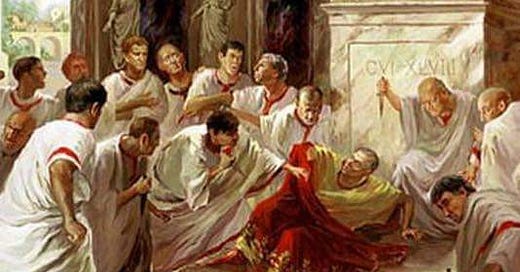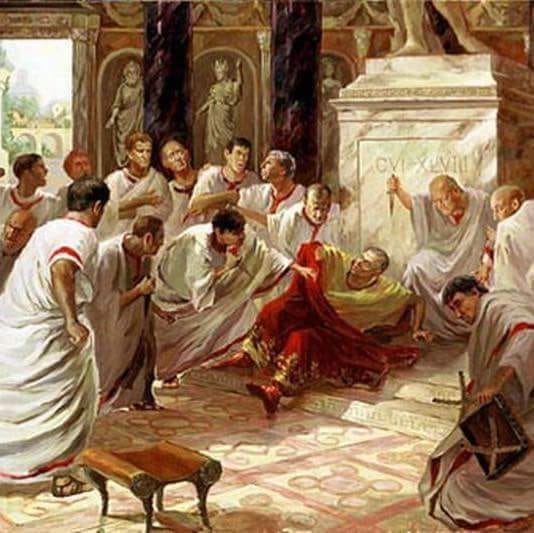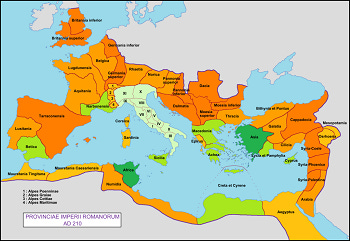For a continent with breathtaking cities from as far west as Belfast in Ireland, to as far east as Kyiv in Ukraine, one that mixes old world architecture with modern charm, Europe has been—and remains— a haven for political discord, tyranny, and the substantial certainty that every 30 years or so, wars will erupt that cause significant strife that’s felt all across the globe.
Such is why the irony is not lost upon me that on today, March 15, 2022, that the “Ides of March,” the date memorialized for the assassination of Roman Dictator Julius Caesar, that Russian Dictator Vladmir Putin's selfish designs have cannon firing once more in Europe, as non-Russians across the globe wonder whether the Russian people will rise up and depose their despotic madman, one who has the world teetering on the brink of World War III?
Russian forces are razing buildings all across Ukraine, including religious centers and hospitals…
It is too soon to tell…
But what I can tell you is that the cliche, “history repeats itself,” is true far more often than it is not—and that political leaders across the ideological spectrum are more concerned with their personal wealth and glory (Putin is reputed to be a billionaire many times over) than the welfare of “the people.”
As to today’s blog title, "Beware the Ides of March," you may recall the phrase from your British Literature or World History courses as a warning that’s bandied about at least once per year; for those in need of reminding, the actual phrase emanates from William Shakespeare's Julius Caesar, where in Act 1 Scene 2, Marcus Junius Brutus, a mentee of Caesar’s and son of his paramour, Servillia, tells Caesar that a mystic fortune teller bids him to beware on this particular date.
Artistic rendering of Julius Caesar's assassination of March 15th of 44 B.C.
In real life, Caesar's need to be wary was no fiction; on the Ides in 44 BC, he was killed after being stabbed over 60 times by a group of conspiring Roman Senators, which included his dear mentee, friend (and rumored illegitimate son) Brutus.
Now, for those wondering what, exactly, were/are the “Ides,” the answer is that the Roman calendaring system marked three important days and instead of numbers falling in sequence from 1-31, as is our custom today, Romans would count days forward or backwards from the Kalends, typically the first day of the month; the Nones, or the 5th through 7th days of a given month, and the Ides, which usually fell between the 13th to 15th of a given month. The Ides also corresponded with the phase of the moon and in March, the full moon typically falls around this time, thus making the same an omen within which a dastardly deed, such as assassinating the leader of the Roman Republic, fortutitous to those who observed such portents. (Nota Bene: As today is March 15th, I noticed a resplendent full moon over Florida last night before I retired for the evening).
How did Julius Caesar become Dictator
Gaius Julius Caesar was born in 100 B.C. to a patrician (wealthy) family, and was the third in his family line to bear that name. After formal education, Caesar embarked upon a military career, one that would eventually find him and his legions engaging in campaigns in Northern Europe against Germanic tribes in and around Gaul, or modern day France. Caesar's military exploits led to his classic work Commentaries on the Gaellic War, where he describes his tactics and efforts to subjugate Gaul in the name of the Roman Republic.
By 216 A.D., nearly 300 years after Julius Caesar’s assassination, the Roman Empire stretched from modern day England in the west, to North Africa in the south, to Germany in the north, and to Turkey in the east. The Mediterranean Sea, as shown here, was called “Mare Nostrum” in Latin, which translates as “Our Sea.”
Before his success in Gaul, around 60 B.C., during the waning days of the Roman Republic, Caesar ran for the position of consul and won during an election that was marked with accusations of bribery. Fearing civil unrest, Caesar formed what would be later known as the "First Triumvirate," along with Gnaeus Pompeius Magnus, or Pompey, and Marcus Crassus. Triumvirate translates from Latin as "three men," as the same three men ruled Rome from 59 B.C. until Crassus died in 53 B.C.
By the time Crassus died, Caesar's military success in Gaul had not only made him a hero back in Rome, but it created great enmity among many wealthy Romans who feared that Caesar would shun a dual form of leadership with Pompey to declare himself a dictator, or "tyrant," in contravention of Roman law.
By 50 B.C., with most of Gaul under Caesar's direct rule after his vanquishing of Germanic leader Vercigetorix two years earlier, the Roman Senate, then under the direction of Pompey, ordered Caesar to disband his armies. Refusing, Caesar, along with his close friend and trusted general, Marc Antony, marched south and in 49 B.C., "Crossed the Rubicon (River)," another popular English phrase from Roman antiquity that means that one has proceeded past the point of no return with respect to an engagement or dispute.
Artistic rendition of Julius Caesar defeating Vercengetorix in Gaul (France)
By 48 B.C., Caesar had routed the forces under Pompey's command, which led Pompey to flee to Egypt, where he was later assassinated. Caesar was then appointed Dictator in Rome, first for a one year stint that was followed by a 10 year term of office. In 46 B.C., Caesar penned a missive to the Roman Senate following his victory over Pharnaces II of Pontus near the city of Zela (near modern day Turkey) that exclaimed: "Veni, Vidi, Vici," or "I came, I saw, I conquered," a confident (if not arrogant) phrase that remains yet another oft repeated Roman idiom in modern English.
While Caesar had vanquished Pompey and many of his former foes during the five years since he crossed the Rubicon River, he left others alive, including famed lawyer/writer Marcus Tullius Cicero, and Brutus, both of whom soon devised a plan to kill him and restore the dual consulship, or leadership of two, to the Republic. Caesar's trusted friend Marc Antony was aware that a plot was in the works, but was prevented from arriving at the Senate in time to prevent Caesar's fate; while Shakespeare's version of Caesar's last words left modernists with the phrase "Et Tu Brute," or "you, too, Brutus," both Plutarch and Suetonius, famous Roman essayists/historians, make no mention of Brutus striking the death blow—or such words being spoken by a dying Caesar.
While Brutus and Cicero believed themselves to be heroic figures who had freed the Roman people from Caesar's tyrannical yoke, the truth is that by killing Caesar, Rome and the Republic soon devolved into a perpetual state of war and civil unrest for well over another decade.
Julius Caesar's death would later be completely avenged when his nephew and heir, Octavian, successfully waged war against his uncle's former foes. In 40 B.C., Octavian had nearly 300 senators executed on the Ides of March and, in 27 B.C., having vanquished all of his uncle's foes (and even his friend, Marc Antony) in battle, declared himself the very first Emperor of Rome—Augustus Caesar!
Statue in Rome of Augustus (Octavian) Caesar, nephew of Julius Caesar and founder of the Roman Empire…
Again, history is fascinating because past human behavior often informs present day events. Thus, Vladimir Putin's “presidency” is nothing of the sort—his is a dictatorship along the same ideological lines as Julius Caesar’s. Vladimir Putin is one of the wealthiest men in the world, as was Julius Caesar during his rule. Vladimir Putin dreams of returning Russia to the world stage as a power on par with the United States and China, much as Caesar dreamt of Rome controlling all of Europe, Africa, and Asia minor, which was not accomplished under his short watch, but was eventually secured under his nephew, Octavian/Augustus, and subsequent Roman Emperors over the next four centuries.
When I look into Putin’s eyes, he seems “a little touched in the head” (crazy), as my elders used to say…
The major difference between now and then is that Ancient Rome was a military power during the era of swords and shields, while modern Russia sits on a nuclear arsenal that, if engaged, will draw a nuclear response from the U.S. and her allies—a fate that could literally end the world as we know it for all peace loving people in the world—including Russians! Which is why on this Ides of March, 2022, Hobbs the Historian will continue to watch and wonder whether Dictator Vladimir Putin will suffer the same fate as Dictator Julius Caesar?
Stay tuned…
Thank you for subscribing to the Hobbservation Point—have a great day!










Man, you know your history. ❤️